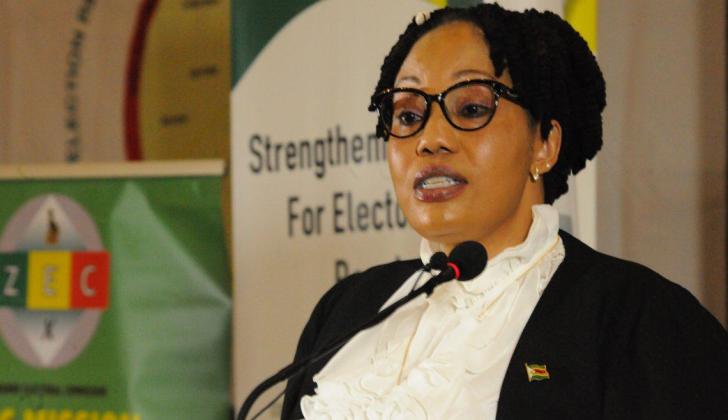News / National
Chigumba's ZEC starts preparations for Zimbabwe's 2028 elections
02 Oct 2024 at 09:00hrs |
1 Views

The Zimbabwe Electoral Commission (ZEC) convened a two-day conference in Nyanga this week to review the 2023 harmonised elections, with key issues including the extension of voting rights to Zimbabweans abroad, the need for transparency in the presidential vote tabulation, and allegations of bias from both the police and ZEC.
ZEC Chairperson Justice Priscilla Chigumba opened the conference on Tuesday, highlighting its importance in leading to electoral reforms and marking the official start of preparations for the 2028 national elections. The conference, attended by over 160 stakeholders from political parties, civic organizations, and various constitutional commissions, aimed to evaluate ZEC's performance during the elections.
While government officials praised ZEC and the police for a successful electoral process, representatives from civic organizations, including Elisabeth Valerio of the United Zimbabwe Alliance (UZA), contended that the elections were neither free nor fair. Valerio claimed that many candidates from her party were unjustly disqualified by ZEC and criticized the police for their perceived bias towards the ruling party, Zanu-PF.
ZEC Vice Chairperson Ambassador Rodney Kiwa encouraged Zimbabweans to contribute their views on the electoral process, stating that the review should extend beyond the conference. ZEC lawyer Tawanda Kanengoni noted that electoral laws contain ambiguous areas that disrupt the process, advocating for the establishment of an Electoral Court.
Journalists raised pressing questions during the conference, including the lack of transparency regarding presidential results and the perceived unequal treatment of political parties by law enforcement. CCC MP Charles Moyo suggested automatic voter registration for those turning 18.
Officials from the Zimbabwe Media Commission urged ZEC to enhance its media strategy, focusing on digital platforms due to the diminishing reach of traditional media. They emphasized that digital engagement will be crucial in the lead-up to the 2028 elections, especially with the introduction of services like Starlink.
Additionally, women's organizations called for stricter penalties for political parties failing to meet the 50-50 gender representation requirement, including denying them registration for elections.
ZEC CEO Utoile Silaigwana defended the commission's actions, stating that many issues attributed to ZEC are rooted in the existing laws and called for legislative reforms to facilitate changes, including the possibility of allowing a diaspora vote, which is contingent upon changes to the law.
The conference concluded with a recognition of the challenges ahead, as stakeholders emphasized the need for comprehensive reforms to ensure a more transparent and equitable electoral process in future elections.
ZEC Chairperson Justice Priscilla Chigumba opened the conference on Tuesday, highlighting its importance in leading to electoral reforms and marking the official start of preparations for the 2028 national elections. The conference, attended by over 160 stakeholders from political parties, civic organizations, and various constitutional commissions, aimed to evaluate ZEC's performance during the elections.
While government officials praised ZEC and the police for a successful electoral process, representatives from civic organizations, including Elisabeth Valerio of the United Zimbabwe Alliance (UZA), contended that the elections were neither free nor fair. Valerio claimed that many candidates from her party were unjustly disqualified by ZEC and criticized the police for their perceived bias towards the ruling party, Zanu-PF.
ZEC Vice Chairperson Ambassador Rodney Kiwa encouraged Zimbabweans to contribute their views on the electoral process, stating that the review should extend beyond the conference. ZEC lawyer Tawanda Kanengoni noted that electoral laws contain ambiguous areas that disrupt the process, advocating for the establishment of an Electoral Court.
Officials from the Zimbabwe Media Commission urged ZEC to enhance its media strategy, focusing on digital platforms due to the diminishing reach of traditional media. They emphasized that digital engagement will be crucial in the lead-up to the 2028 elections, especially with the introduction of services like Starlink.
Additionally, women's organizations called for stricter penalties for political parties failing to meet the 50-50 gender representation requirement, including denying them registration for elections.
ZEC CEO Utoile Silaigwana defended the commission's actions, stating that many issues attributed to ZEC are rooted in the existing laws and called for legislative reforms to facilitate changes, including the possibility of allowing a diaspora vote, which is contingent upon changes to the law.
The conference concluded with a recognition of the challenges ahead, as stakeholders emphasized the need for comprehensive reforms to ensure a more transparent and equitable electoral process in future elections.
Source - The Mirror
Join the discussion
Loading comments…











































